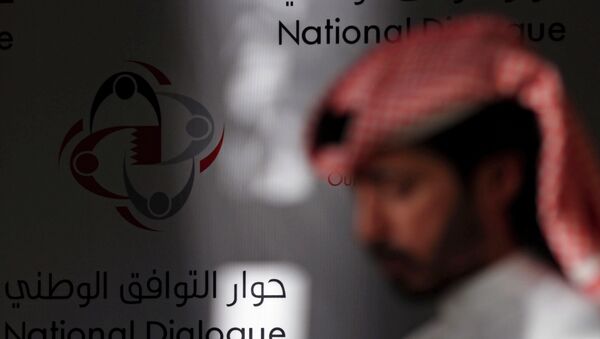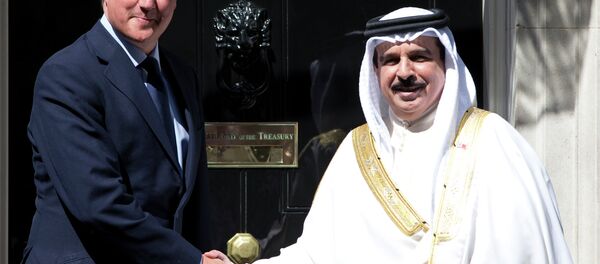Following a decision in London's Information Tribunal to partially disclose the contents of the diplomatic cable, foreign office officials have expressed their concern about how potentially damaging the release of the document could be for Britain's relationship with Bahrain, a traditional ally in the Gulf.
Pressure on US to contemplate removing Fifth Fleet's HQ from Bahrain. Alkhalifa dictatorship is total embarrassment. UK must follow #Bahrain
— Saeed Shehabi (@SaeedShehabi) May 19, 2015
The cable relates to a 1977 assessment report on Bahrain's internal security situation, based on a conversation between then head of the Bahrain Special Branch, Ian Henderson, and FCO official David Tatham.
"What surprised me in our conversation was the gloomy view he took of the ability of the Al Khalifa to survive," Mr Tatham wrote of the conversation, while large parts of the document were either blacked out or redacted.
Concerns Docs May Hurt Naval Base Plans
While making a case to keep the documents suppressed, Edward Oakden, the Foreign Office's Middle East director, argued that the passages of the document were classified "on the grounds that international relations could be damaged were it to be released. Those grounds still exist."
You can read Judge's full verdict on the Henderson Files aka Butcher of Bahrain on the Information Tribunal's website http://t.co/84NIjGtmfS
— Bahrain Watch (@BHWatch) May 22, 2015
The Foreign Office expressed concern about the impacts the release of the details could have on plans for the UK to build a naval base in Bahrain, which would be the UK's first permanent military presence in the Middle East since the 1970s.
Does the UK have a red-line when it comes to Bahrain's rights abuses? http://t.co/IIq9MagdAP pic.twitter.com/eCO68fQh5F
— Middle East Eye (@MiddleEastEye) May 19, 2015
"Bahrain was a generous host of the Royal Navy and the Royal Air Force, providing basing and overflight rights free of charge. In December 2014, the Foreign Secretary signed a Memorandum of Understanding with the Government of Bahrain to establish a more permanent naval base in Bahrain, which the King had agreed to fund," Mr Tatham said in his address to the court.
Campaigners for activist group Bahrain Watch, who brought forward the case, believe the UK Foreign Office's commitment to keeping the contents of the report suppressed indicates that censored parts of the document may contain disparaging remarks about members of Bahrain's ruling family, including some that are to still be alive today.
UK Accused of Overlooking Bahrain Human Rights Concerns
The release of any extra parts of the assessment report document would also provide the UK with additional embarrassment and more pressure to scale back its relationship with Bahrain, amid growing concern over the Gulf country's human rights record.
The UK has been accused of putting money and defense ahead of human rights, as Britain continues to export arms to Bahrain despite evidence suggesting the country has been involved in excessive violence and torture against political protestors.
HM King of Bahrain called to congratulate PM on 'excellent' win. Both agreed to build on almost 200 years of strong UK-Bahrain relations,
— UK Prime Minister (@Number10gov) May 15, 2015
While happy to see additional parts of the document released, solicitor Sue Willman, who worked on the case, said it was disappointing not to see a full disclosure of the document.
"Half of the judgment is secret so we still don't know the secret reasons why we cant see the secret evidence. The decision to disclose a bit more is welcome, but I am disappointed that the tribunal has not upheld the public interest in seeing all the evidence in the light of continuing reports of serious human rights violations from Bahrain including the Human Rights Watch report on torture in Jau prison."
Marc Owen Jones, Durham university PhD student and member of Bahrain Watch, who initially requested the information from the FCO in 2013, agreed with Ms Willman, but criticized the lengthy legal process required to uncover the document.
"It's a form of bureaucratic repression, and we are reluctant to frame this as a victory, and the result is essentially a facade of transparency that still allows the British government to shield its allies from proper scrutiny."
The British government has until May 30 to appeal the decision.





